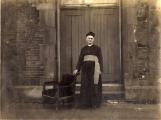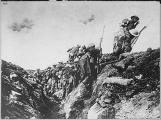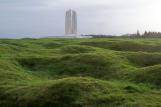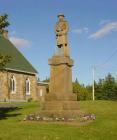1
Father Colin Chisholm, Parish Priest 1868-191920th Century, Circa 1920
Port Hood, Nova Scotia
 Credits:
Credits:Chestico Museum
3
Canadians Going Over the Top at Vimy RidgeWorld War I, 1917
Vimy Ridge, France
 Credits:
Credits:http://greensleeves.typepad.com/berkshires/images/2007/06/05/canadians_over_the_top.jpg
4
Vimy Ridge Monument and Battlefield21st Century, Circa 2008
Vimy Ridge, France
 Credits:
Credits:http://www.flickr.com/photos/cragglesmapa/404935996/
6
Judique War Memorial21st Century, Circa 2008
Judique, Nova Scotia
 Credits:
Credits:http://ns1763.ca/inverco/judiquem.html
7
The First World War or the Great War was believed at the time to be "the war to end all wars"--so great was the loss of life. A generation of young men was nearly decimated in Europe. Casualties were much higher in this war than in the Second World War and Canada suffered an astounding rate of casualties in proportion to its population---about one-tenth of enlisted personnel. Yet, at the time, people believed that the sacrifice was worth it. The legacy of the Great War was that it would be repeated on an even greater scale some twenty years later and the sons and daughters of some of the First War's veterans would serve in the second. The dead of the Great War were buried in mass cemeteries in France and Belgium--the first time in history that war dead were commemorated on such a scale and this remembering prompted the erection of war memorials in most towns and cities where people still come to remember their great sacrifice each Remembrance Day.In this following exerpt from the Port Hood Greetings written while the war was still raging in Europe---one of the first Port Hood veterans to return home, bears witness to what is happening at the front. Angus J. MacDonnell, who lost his arm during the Battle of Vimy Ridge, speaks on behalf of his fellow soldiers:
"SPEECH OF PRIVATE ANGUS J. MACDONNELL, JUDIQUE (August 29, 1917, St. Peter's Parish, Port Hood)
The following is a synopsis of a patriotic speech delivered at the Banquet in connection with the Golden Jubilee of the Right Reverend Monsignor C. Chisholm P.P. in response to the Toast to
'Our Boys at the Front'
Gentlemen:
In the name of my companions still at the front, I thank you for the warmth I had, almost affection, with which you have honoured this toast. When the tidings shall have reached them, as it certainly will in due and very brief course, it will encourage and cheer them to learn that at home they are remembered with increasing kindness if such be possible; theirs is not an easy, but it is a glorious task.....
The war has taught the world several lessons. On of these is that no artificial fortress has hitherto been built, can withstand the immense cannon that is manufactured today. Antwerp was perfect proof against any assault that could be made in olden times, but it fell in two or three days before the missives that were poured out of the modern artillery of the Germans and the artillery of the British army made still more recently is much more powerful than anything of the kind possessed by the enemy...
But the example of Vimy Ridge and the exploits of the Canadians there show that the personal superiority of man over man, of Britain over Teuton is as necessary today to gain victories as ever it was in the past.....I was in the thick of the great fight that will be described in song and story, embalmed in history, embellished in romance and recited at domestic hearth as long as brilliancy of military action challenges the administration of the world; Canadians will speak of it forever with a share of that spirit that animates Scotchmen when they recall the victory of Bannockburn. It is an indelible landmark in the scenery of the past, and yet to us in the field and when I speak of personal experience, I am sure I re-echo the sentiments of every one of my companions -- we thought of nothing but stern, unflinching, unyielding patriotic duty. Our Country needed us, the freedom of the world it is not too much to say called on for sacrifice, and we did not hesitate one moment in giving a convincing response. Our duty seemed to us an ordinary incident, and we were astonished next day to find that it had made us famous. We are proud of it since, prouder than we possibly could be of anything we could have done had we remained sullen "slacks" at home. My only regret is that the arm I lost two days afterwards which in the situation that seemed perfectly safe, was not lost when I was in the midst of the immortal conflict that was wrestling with death and carnage on every side....
I take it then that when you drank the toast, you drank to the honour of all, of the dead, of the wounded, of the uninjured at the front of reinforcements which are preparing to be sent to the battlefield, and in the name of all, I thank you, your influence and ability will do much to help out the good cause, and I have no doubt whatever that it will be earnestly, becomingly and most successfully exerted.
Port Hood Greetings, September, 1917
David W. Jones, Printer and Editor

